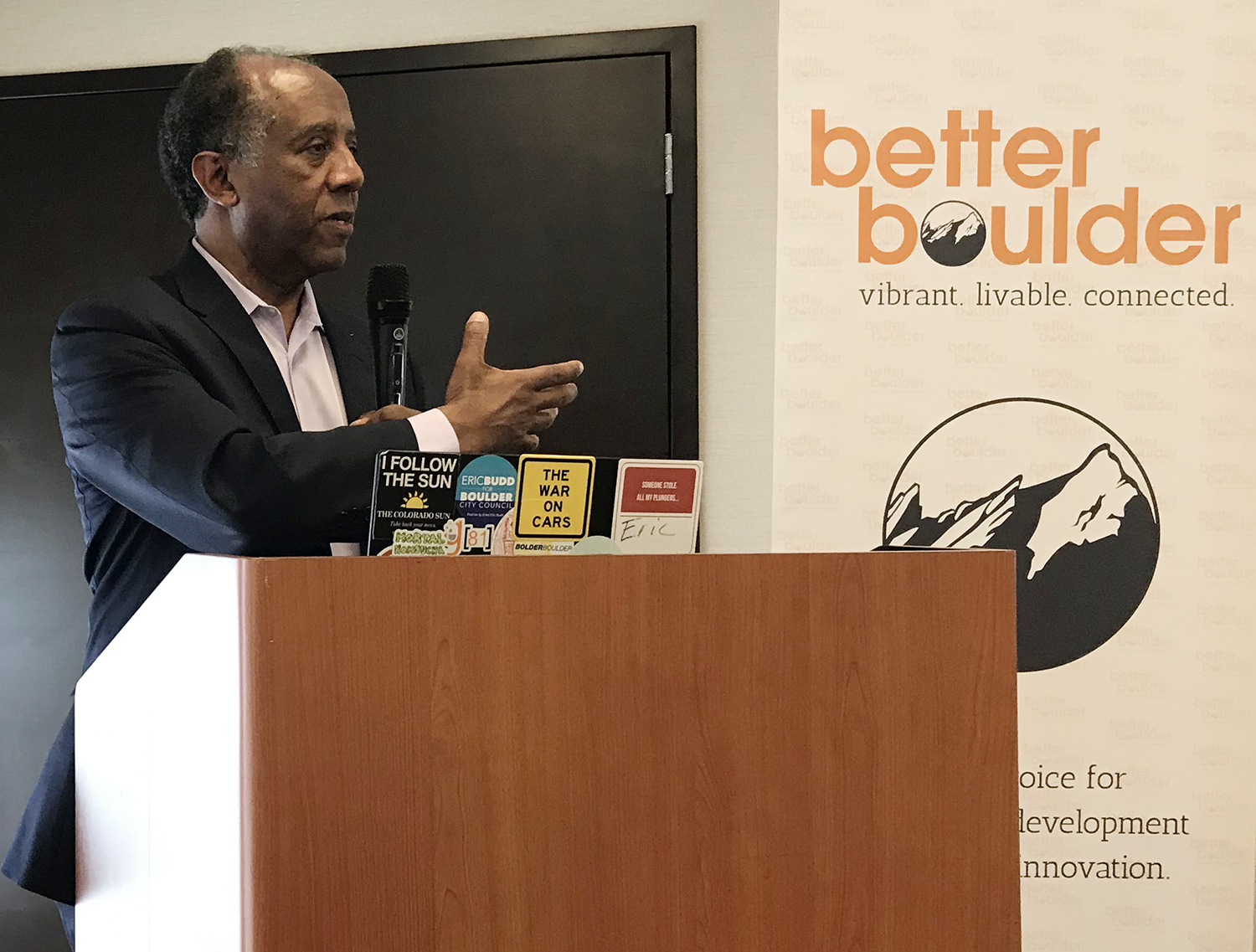Contact Information:
Better Boulder
Eric Budd
720-295-1122
ericbudd@gmail.com
Release Date:
March 2nd, 2020
Better Boulder Smart Growth Innovation Conference brings local and national experts toshare strategies to make Boulder more sustainable, affordable, and equitable
BOULDER, COLORADO — On Saturday February 29th, leaders in transportation, planning,sustainability, and social justice joined over 100 local residents to learn and get involved in themovement to make Boulder more sustainable, affordable, and equitable.
Boulder Mayor Sam Weaver introduced the conference, giving details about the city’s affordablehousing and inclusivity efforts. Weaver highlighted two current examples, including preservingaffordable housing with 1-to-1 replacement in Boulder’s Ponderosa mobile home park. Weaveralso discussed a project currently underway at 30th and Pearl street, which includes a largepercentage of permanently affordable housing with a mix of market rate homes.
Sam Assefa, Director of Planning for Seattle, Washington, and a former City of Boulder urbandesigner, led the conference’s keynote talk with many of the challenges and strategies fromSeattle in the past four years. From the city’s beautiful natural landscapes, the incredible jobgrowth in tech companies, the need for accessible transit and non-car options, rising rents andhomelessness, and a legacy of racist housing policy, Sam highlighted that Boulder and Seattleare “of different scales, but have the same issues. The wishes and goals are the same.”
Assefa’s presentation focused on four pillars: managing growth, affordability, equity, andlivability. On the housing affordability side, solutions focused on incentives for family-sizedhousing, reducing permitting barriers, and more efficient construction, as well as boosting thenumber of permanently affordable homes built. Other ideas implemented are voluntaryincentives for affordable housing and allowing additional housing units in single-family areasthat are well-served by transportation. To improve livability and access, Assefa discussedincreasing transit-oriented development and increasing funding for transit, bike, and pedestriannetworks.
On growth with equity, Sam presented the Equitable Development Initiative, that focuses ondistributing the benefits of growth equitably, prioritizing marginalized populations, using a raceand social equity lens, addressing displacement, and increasing opportunities for low-incomehouseholds.
During the panel discussion led by former Boulder City Councilwoman Angelique Espinoza,each panelist took some time to address areas of smart growth strategies from their own field ofexpertise.
Travis Madsen, a transportation program director, talked about his organization’s report onBoulder, called “Growing Greener.” His group, the Southwest Energy Efficiency Program,focused on “how to be more sustainable and reduce car use. To help people live closer towhere they work, go to school, or shop.”
Martha Roskowski, Principle at Further Strategies and a former transportation manager at Cityof Boulder, continued on the theme of a city with transportation options that work for everyone.Roskowski noted that our current urban growth strategy “pushes people out of our populationcenters to places where housing is cheaper but transportation costs are huge.”
Elena Wilken, Executive Director of Housing Colorado, talked extensively about housingchallenges that exist in Boulder but also the entire front range of Colorado. Several factorscontribute to high housing costs, including significant job growth, an inability to build enoughaffordable housing units, and constraints on the types of housing we offer. “We need differenthousing products for different stages of people’s lives.”
Madelyn Strong Woodley, a social justice advocate and lifetime member of the NAACP,advocated for people-focused approaches. “I have found a common thread to be the need toengage community.” Strong Woodley told the story of growing up on a farm in Tennessee andthe continual need for a connection to local food. Now living in Longmont, she continues to workfor inclusive communities. “Better Boulder – that says it all. It says the objective we are workingtoward. If we come together to understand and develop a plan that’s workable, we will have abetter Boulder.”
The conference ended with a call to action, asking attendees to help guide Better Boulder’sboard to focus on the most impactful changes for the organization to work on in 2020.
Keynote:
Sam Assefa – Director of Planning & Community Development, Seattle Washington, FormerSenior Urban Designer, City of Boulder
Panelists:
Travis Madsen – Transportation Program Director, Southwest Energy Efficiency ProgramMartha Roskowski – Principle, Further Strategies
Elena Wilken – Executive Director, Housing ColoradoMadelyn Strong Woodley – Civil and Social Justice Advocate, Longmont Housing and HumanServices Board, NAACP Boulder County
Additional Resources:
PDF of keynote presentation, “From the Gold Rush to the Tech Rush – Better Boulder SmartGrowth Innovation Conference”
Photos from the event: Link

